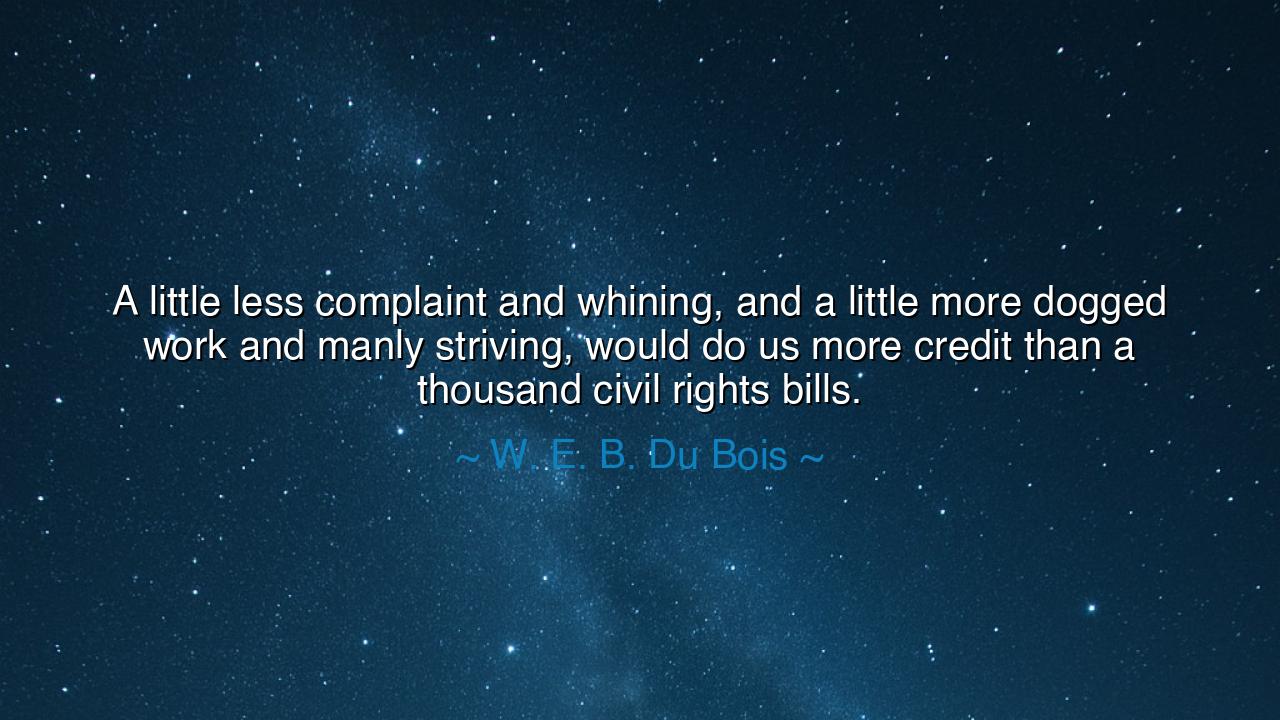
A little less complaint and whining, and a little more dogged
A little less complaint and whining, and a little more dogged work and manly striving, would do us more credit than a thousand civil rights bills.






The words of W. E. B. Du Bois, in saying, “A little less complaint and whining, and a little more dogged work and manly striving, would do us more credit than a thousand civil rights bills,” speak with the solemn gravity of one who has peered into the soul of a people. He warns that liberation is not solely wrought by parchment and decree, but by the inner fortitude that springs from discipline, labor, and dignity. For laws may shift the structure of a society, but only character and perseverance temper the spirit of a nation.
This counsel emerges from the heart of a man who walked the hard road of racial struggle. Du Bois, scholar and warrior of the mind, understood the worth of legislation, yet he also beheld its limits. Civil rights bills may open doors, but it is striving, the relentless press forward with sweat and resolve, that grants a people true standing among the nations. Without the strength of will, the law remains a hollow shell, unfilled by the power of human effort.
In these words lies a rebuke, but also a summons. To dwell in complaint is to chain oneself to impotence, to cast one’s eyes ever upon the oppressor rather than lifting them to the heavens of one’s own destiny. To labor with dogged work is to claim mastery over fate, to mold life with hands calloused yet noble. This is not a dismissal of justice, but a call to deeper manhood and womanhood — to embrace the labor of self-fashioning as a sacred charge.
And so, Du Bois places the weight of greatness not only upon rulers and lawmakers, but upon the very shoulders of the oppressed. He teaches that a people prove themselves not through endless grievance but through the shining testimony of their own works. Thus his words echo like an ancient oracle: laws may protect, but it is manly striving, undaunted and unyielding, that makes a race immortal.






QDquoc dang
Du Bois’ statement on complaining and striving highlights the need for self-discipline and commitment. However, isn’t there a fine line between productive work and ignoring valid grievances? Complaints and the push for civil rights bills are not always about whining; they often serve as a form of resistance to oppressive systems. How can we differentiate between unnecessary complaining and the rightful call for societal change through advocacy?
HDHa Dan
Du Bois' quote raises an interesting perspective on personal responsibility versus external change. It’s true that focusing on hard work and ‘manly striving’ can sometimes yield better results than complaining. But at the same time, how can we ignore the fact that civil rights bills and societal changes are critical to dismantling inequality? Can we truly succeed without balancing both individual striving and legal reforms to address systemic issues?
THTran Thi Thu Huynh
While I agree with Du Bois’ emphasis on hard work and personal determination, I think it’s important to also consider the historical context. Complaints and calls for change were often the starting point for pushing through essential civil rights laws. Can it be that Du Bois is advocating for personal responsibility, but at the same time ignoring the crucial role that advocacy and activism played in achieving rights for many oppressed groups?
Aathu
Du Bois makes a compelling point about the importance of personal effort and responsibility in creating change. However, I wonder if this message inadvertently downplays the significance of collective action and systemic reform, like the civil rights movement. How do we reconcile the idea that individual perseverance alone can make a difference when societal structures often limit opportunities for marginalized groups? Can we truly achieve equity without both personal effort and systemic change?
KDTran Thi Kim dung
W. E. B. Du Bois' statement seems to emphasize the value of hard work and perseverance over complaints and external solutions. While there is merit in striving and taking action, doesn't this viewpoint risk oversimplifying systemic problems? Civil rights bills and legal changes are often necessary to challenge deeply rooted societal inequalities. Can we really achieve progress without both individual effort and collective action through policy change?